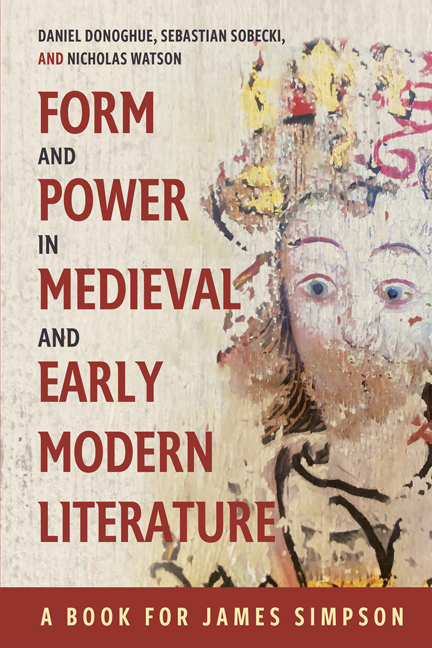Book contents
- Frontmatter
- Contents
- List of Illustrations
- Contributors and Editors
- Acknowledgments
- List of Abbreviations
- Simpson: An Interim Report
- PART I THE HERMENEUTICS OF RECOGNITION
- PART II GENRE AND FIGURE
- PART III CULTURE AND INSTITUTIONS
- PART IV REFORMATIONS
- James Simpson’s Publications from 1984 to 2024
- Bibliography
- A Note on the Bloomfield Conferences
- General Index
- Tabula Gratulatoria
1 - The Shock of the Old: Recognition in the Humanities; The 2022 Morton W. Bloomfield Memorial Lecture
Published online by Cambridge University Press: 17 May 2024
- Frontmatter
- Contents
- List of Illustrations
- Contributors and Editors
- Acknowledgments
- List of Abbreviations
- Simpson: An Interim Report
- PART I THE HERMENEUTICS OF RECOGNITION
- PART II GENRE AND FIGURE
- PART III CULTURE AND INSTITUTIONS
- PART IV REFORMATIONS
- James Simpson’s Publications from 1984 to 2024
- Bibliography
- A Note on the Bloomfield Conferences
- General Index
- Tabula Gratulatoria
Summary
So here's how it went. I’m walking into Harvard Yard on a summer's day, as a rather plump, entirely bald male is walking towards me. I do not recognize him. I cannot, however, help noticing that the person coming towards me exhibits, in very low level and understated form, signs of having recognized me. There is, I intuit, something in his eye movement that expresses greeting. This is always a troubling social predicament. One is caught in a dilemma we have all experienced: either one will be thought rude, if one does not respond to the manifested signs of recognition; or, if one does respond, one runs the risk of being thought slow-witted, on discovering, to one's acute embarrassment, that one had misread those tiny, ambiguous signs of possible recognition – the minuscule eye movements of a complete stranger had not meant “hello” after all.
“After all” is in fact an exaggeration in such circumstances, since encounters of this kind happen in real time, as two creatures approach each other, both walking at brisk pace, from a distance of only two or three yards. With only a couple of seconds available, one's judgment goes into overdrive, but mine wasn't coming up with a decision in time. The apparent stranger, however, released me from this mini-agony.
The dénouement: as we are about to pass beyond each other, the apparent stranger breaks out into a broad smile. Suddenly there is no ambiguity: within a millisecond I stop observing and start recognizing: this is my friend John, who has been absent from campus for many months undergoing chemotherapy.
John had been trim, with plenty of hair, when last I saw him, just before he went in for treatment. “John!” I exclaimed as we warmly shook hands and enjoyed our mutual relief, not to say joy. John was perhaps happy to be back in the land of the living, but I was much more than happy: that sudden flash of my friend's smile transformed everything in an instant – it transformed one quick moment of embarrassment into blissful cognitive certainty; and it transformed months of uncertainty about the fate of my friend into the joy that here he was, fully alive and present. Not least, it transformed observation into recognition.
- Type
- Chapter
- Information
- Form and Power in Medieval and Early Modern LiteratureA Book for James Simpson, pp. 13 - 34Publisher: Boydell & BrewerPrint publication year: 2024

